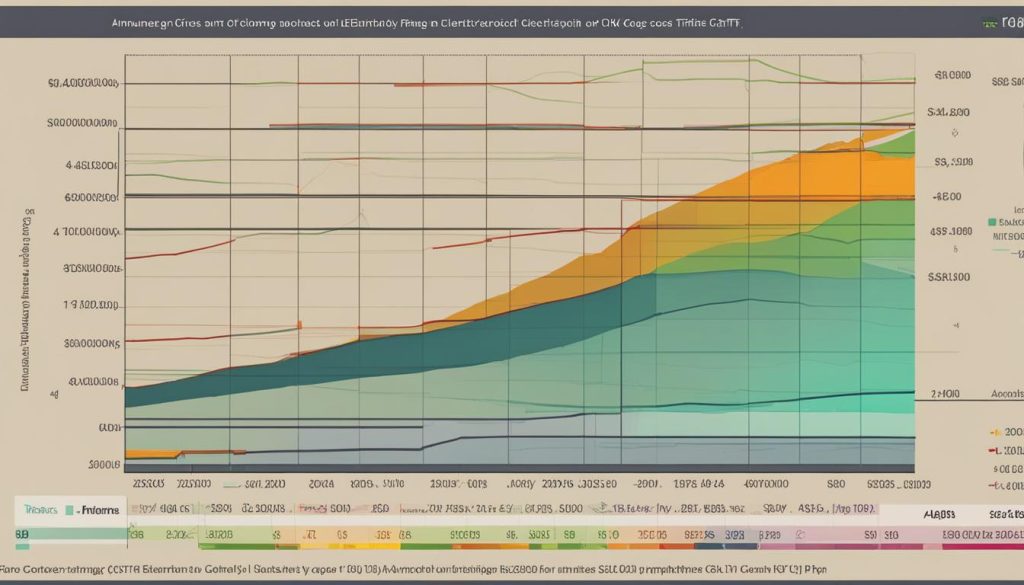Rising Electricity Prices: UK Market Trends and Tips
Electricity prices in the UK have been on the rise in recent years, causing concern for both individuals and businesses. The increasing energy costs have been fueled by a combination of factors, including the global demand for energy, the cost of generating electricity, and government policies. As a result, managing electricity bills has become a priority for many.
When it comes to electricity bills, understanding electricity tariffs, rates, and suppliers is crucial. It enables consumers to make informed decisions about their energy consumption and find the best deals available. Moreover, taking steps to reduce energy usage and implementing cost-saving measures can make a significant difference in managing electricity bills.
Key Takeaways:
- The UK has experienced rising electricity prices in recent years
- Factors contributing to increased energy costs include global demand, generating costs, and government policies
- Understanding electricity tariffs, rates, and suppliers is essential for managing electricity bills
- Implementing energy-saving measures can help individuals and businesses reduce energy costs
- Comparing electricity tariffs is critical in finding the best deals for electricity rates
Understanding UK Electricity Tariffs and Rates
Electricity tariffs and rates vary across the UK. Suppliers determine their prices based on various factors, including the cost of generating and supplying energy, profit margins, and government regulations. It can be challenging to navigate the market and find the best deals, but comparing tariffs is essential in reducing energy costs and saving money on electricity bills.
How do electricity tariffs work?
Electricity tariffs refer to the rates that a supplier charges for unit energy consumption. The tariffs typically comprise two portions: a standing charge and a unit rate. The standing charge is a daily rate that covers the fixed costs of supplying energy, such as maintenance and repair costs, while the unit rate is the actual cost of each unit of electricity used.
There are two main types of electricity tariffs:
- Standard variable tariffs (SVTs) – the default tariff offered by suppliers, with fluctuating rates that change depending on market conditions. Generally, SVTs are the most expensive option.
- Fixed-rate tariffs – offer a fixed unit rate for a set period, usually 1-2 years. These tariffs provide price certainty and protection against price increases, but they may be more expensive than SVTs in the short term.
The importance of comparing tariffs
With so many options available, comparing tariffs is crucial in finding the best electricity deals. Comparing electricity tariffs allows consumers to discover the cheapest deals and determine which suppliers best suit their needs.
It is important to note that price isn’t the only factor to consider when comparing tariffs. Other factors, such as customer service, renewable options, and contract flexibility, may also influence the decision.

Using online comparison services can make the process of comparing tariffs easier and more efficient. These services allow consumers to input their energy usage and preferences and receive a list of suppliers and tariffs suited to their needs.
Tips for Saving on Energy Costs
Managing energy costs is a priority for individuals and businesses alike. Here are some practical tips to help reduce energy consumption and save on electricity bills:
Evaluate your energy usage
Start by understanding where you are using the most electricity. Identify areas where you can reduce usage without impacting daily operations. This can involve turning off unnecessary lights, electronic devices and adjusting thermostats.
Upgrade to energy-efficient appliances
Opt for energy-efficient appliances rated A+++ to replace older models. Though they may cost more initially, energy-efficient models can save money in the long run, reducing energy costs substantially.
Consider a smart meter
Investing in a smart meter can help you monitor energy usage in real time. The data you collect can then inform energy-saving strategies and give you a realistic understanding of your consumption patterns.
Switch to renewable energy sources
Renewable sources of energy can provide cost-effective alternatives. Consider incorporating solar panels or wind turbines to generate power and save on energy bills. Additionally, looking into government schemes that promote renewable energy can offer extra savings.
Compare energy tariffs
Compare energy tariffs regularly to ensure that you are getting the best deal. Take advantage of price comparison websites, and look out for special offers that may be available for new customers or when switching providers.
By implementing some of these practices, it is entirely possible to reduce energy costs and keep electricity bills down.

Conclusion
In conclusion, managing rising electricity prices in the UK requires staying informed and taking action to reduce energy consumption. By understanding the various electricity tariffs and rates, individuals and businesses can compare and find the best deals to save on their energy bills.
Implementing small changes in daily routines such as turning off appliances when not in use, using energy-efficient light bulbs, and using curtains or blinds to retain heat can significantly reduce energy costs.
Furthermore, exploring renewable energy options such as solar panels and wind turbines can provide long-term savings on electricity bills. Government schemes such as the Renewable Heat Incentive and the Feed-in Tariff can also help make electricity more affordable and sustainable.
Therefore, it is crucial to apply the tips provided and adopt a proactive approach in managing rising electricity prices to achieve significant savings on energy bills.
FAQ
What factors contribute to the rising electricity prices in the UK?
Rising electricity prices in the UK are influenced by various factors, including the increasing costs of fuel and raw materials, investment in infrastructure, government policies and regulations, and market competition.
How can individuals and businesses effectively manage their electricity bills?
There are several ways to manage electricity bills. These include adopting energy-saving habits, such as turning off lights and appliances when not in use, investing in energy-efficient technologies, comparing electricity tariffs and rates from different suppliers, and exploring renewable energy options.
What are electricity tariffs and how do suppliers determine their prices?
Electricity tariffs are the pricing structures used by suppliers to charge consumers for the electricity they use. Suppliers consider various factors when determining their prices, such as the cost of generation, transmission, and distribution, as well as government levies and taxes. They offer different tariffs, such as fixed-rate, variable-rate, and time-of-use tariffs, to cater to the diverse needs of consumers.
Why is it important to compare electricity tariffs?
Comparing electricity tariffs allows consumers to find the best deals and potentially save on their energy bills. Different suppliers offer different rates and incentives, so comparing tariffs can help individuals and businesses identify the most cost-effective options that suit their energy consumption patterns and preferences.
How can individuals and businesses save on their energy costs?
There are various ways to save on energy costs. Some tips include using energy-efficient appliances and lighting, properly insulating buildings to reduce heat loss, adjusting thermostats to optimal levels, actively monitoring and managing energy consumption, and taking advantage of government schemes and incentives, such as energy efficiency grants and renewable energy installations.




